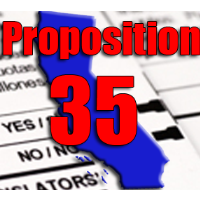U.S. Appellate Court Says State Can’t Require Sex Offenders to Report Online Activities

If you can’t deny First Amendment freedom of speech rights to convicted sex offenders, whose rights can you abuse?
A three-judge panel of the U.S. Ninth Circuit Court of Appeals didn’t answer that question when it ruled (pdf) on Tuesday that the state’s Proposition 35, also known as the “Californians Against Sexual Exploitation Act” (CASE Act), unconstitutionally required registered sex offenders to report their online activities to the state.
The court agreed with the U.S. District Court that registered sex offenders regain their rights after completing probation or parole and that the law chilled those rights in at least three ways. “(1) it does not make clear what sex offenders are required to report; (2) it provides insufficient safeguards preventing the public release of the information sex offenders do report; and (3) the 24-hour reporting requirement is onerous and overbroad.”
Judge Jay S. Bybee, one of the Ninth Circuit’s most conservative justices, wrote for the court, “Just as the Act burdens sending child pornography and soliciting sex with minors, it also burdens blogging about political topics and posting comments to online news articles.”
The law was very popular with California voters; 80% voted for it in 2012. Supporters claim it would help law enforcement short-circuit attempts at human trafficking and exploitation by known offenders. Sex offenders are already required to tell authorities where they live and provide current photos.
The law made it tough for registered offenders to use the Internet at all. They had to quickly notify the authorities if they changed any online “identifiers,” including e-mail addresses, user names, screen names or passwords, for use in Internet chat rooms, forums, social networking or other similar communications.
“There can be little doubt that requiring a narrow class of individuals to notify the government within 24 hours of engaging in online communication with a new identifier significantly burdens those individuals’ ability and willingness to speak on the Internet,” the panel wrote.
They agreed with U.S. District Judge Thelton Henderson, whose decision they upheld, when he wrote: “The court is not persuaded that burdening the anonymous speech rights of all 75,000 registered sex offenders is narrowly tailored to the government’s interest in fighting online sex offenses.”
Henderson expressed a fear that government might abuse the information it gleaned through the law and conceivably release the screen names of all offenders, chilling their free speech.
The American Civil Liberties Union (ACLU) and the Electronic Frontier Foundation (EFF) filed a lawsuit challenging Prop. 35 the day after it passed. EFF attorney Hanni Fakhoury said of the appellate court ruling, “Restrictions targeting sex offenders are often a stepping stone for the expansion of law enforcement power against other classes of unpopular people.”
ACLU lawyer Linda Lye told the San Francisco Chronicle, “Anonymity is key to protecting speech by unpopular or controversial groups.”
The ruling did not invalidate the entire Act. Prop. 35 also increased penalties for human trafficking and required those convicted to be registered as sex offenders. The law also required that members of law enforcement receive human trafficking training.
California Attorney General Kamala Harris can appeal the decision to the full appellate court.
–Ken Broder
To Learn More:
California Can’t Enforce Online Tracking of Sex Offenders (by Karen Gullo, Bloomberg)
Court Bars State from Curbing Sex Offenders’ Internet Privacy (by Bob Egelko, San Francisco Chronicle)
State Can't Make Sex Offenders Give Authorities Their Internet IDs (by Maura Dolan, Los Angeles Times)
Court Blocks California Law Requiring Sex Offenders to Report Online Names And Internet Service Providers (Bay City News Service)
Judge Blocks Human Trafficking Proposition (by Ken Broder, AllGov California)
Doe v. Kamala Harris (U.S. Ninth Circuit Court of Appeals) (pdf)
- Top Stories
- Controversies
- Where is the Money Going?
- California and the Nation
- Appointments and Resignations
- Unusual News
- Latest News
- California Forbids U.S. Immigration Agents from Pretending to be Police
- California Lawmakers Urged to Strip “Self-Dealing” Tax Board of Its Duties
- Big Oil’s Grip on California
- Santa Cruz Police See Homeland Security Betrayal in Use of Gang Roundup as Cover for Immigration Raid
- Oil Companies Face Deadline to Stop Polluting California Groundwater





